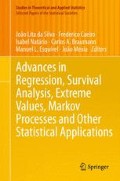Abstract
The research project School Effectiveness in Teaching-Learning of Mathematics allowed a longitudinal study in the primary, elementary and lower secondary education which was conducted between 2004 and 2009 in Portugal. It stated as one of the specific objectives the development and promotion of quantitative methods in education, particularly in mathematics education. This chapter presents a latent class model with concomitant variables applied to the data of a paired sample (data collected at the beginning and at the end of the academic year) of 276 students enrolled in the 7th grade. The response variable represents whether learning has or has not occurred during the year and the concomitant variables are scores to assess the level of fluid intelligence components. Model parameter estimates suggest that there are two distinct latent classes explained by verbal and spatial reasoning.
Access this chapter
Tax calculation will be finalised at checkout
Purchases are for personal use only
References
Almeida, L.S.: Baterias de Provas de Raciocínio Diferencial (BPRD): Manual. [Battery of Differential Reasoning Tests. Manual]. Universidade do Minho, Braga (1992)
American Educational Research Association, American Psychological Association, National Council on Measurement in Education: Standards for educational and psychological testing. American Educational Research Association, Washington (1999)
Cattell, R.B.: Theory of fluid and crystallized intelligence: a critical experiment. J. Educ. Psychol. 54, 1–22 (1963)
Cattell, R.B.: Abilities, Their Structure, Growth, and Action. Houghton Mifflin, Boston (1971)
Costa, P., Oliveira, P.N., Ferrão, M.E.: Modelo de resposta ao item de dois parâmetros: construção de uma escala vertical de desempenho em Matemática. In: Hill, M.M., Ferreira, M.A., Dias, J.G., Salgueiro, M.F., Carvalho, H., Vicente, P., Braumann, C.A. (eds.) Estatística da Teoria à Prática. Actas do XV Congresso Anual da Sociedade Portuguesa de Estatística, pp. 155–166. Edições SPE, Lisboa (2008)
Dias, J.G.: Finite Mixture Models: Review, Applications, and Computer-intensive Methods (Ph.D. Thesis). Ridderprint, The Netherlands (2004)
Ferrão, M.E., Loureiro, M.J., Simões, M.F., Calmão, M.J., Guedes, P.: À Procura da Escola Eficaz - Referencial Teórico no Ensino da Matemática. UBI, Covilhã (2005)
Ferrão, M.E., Costa, P., Dias, V., Dias, M.: Medição da Competência dos Alunos do Ensino Básico em Matemática: 3EMat, uma proposta [Measuring Mathematics Skills of Students in Compulsory Education: 3EMat, a proposal]. In: Machado, C. Almeida, L., Guisande, M.A., Gonçalves, M., Ramalho, V. (eds.) Actas da XI Conferência Internacional de Avaliação Psicológica: Formas e Contextos [Proceedings of the XI International Conference on Psychological Evaluation]. Psiquilibrios Edições, Braga (2006)
Garfield, J.: The challenge of developing statistical reasoning. J. Stat. Educ. 10(3), 1–11. Online:amstat.org/publications/jse/ (2002)
Goodman, L.A.: Exploratory latent structure analysis using both identifiable and unidentifiable models. Biometrika 61(2), 215–231 (1974)
Irwin, K.C., Irwin, R.J.: Assessing development in numeracy of students from different socio-economic areas: A Rasch analysis of three fundamental tasks. Educ. Stud. Math. 58, 283–298 (2005)
Kane, M.J., Gray, J.R.: Fluid intelligence. In: Salkind, N.J. (ed.) Encyclopedia of Human Development, vol. 3, pp. 528–529. Erlbaum, NJ (2005)
McHugh, R.B.: Efficient estimation and local identification in latent class analysis. Psychometrika 21(1), 331–347 (1956)
Niss, M.: Aspects of the nature and state of research in mathematics education. Educ. Stud. Math. 40, 1–24 (1999)
Phelps, E., William, D.: Problem solving with equals: peer collaboration as a context for learning mathematics and spatial concepts. J. Educ. Psychol. 81(4), 639–646 (1989)
Primi, R., Ferrão, M.E., Almeida, L.: Fluid intelligence as a predictor of learning: a longitudinal multilevel approach applied to mathematics. Learn. Individ. Differ. 20(5), 446–451 (2010)
Vicente, P.: Plano amostral do projecto 3EM - eficácia escolar no ensino da matemática. In: Ferrão, M.E., Nunes, C., Braumann, C.A. (eds.) Estatística Ciência Interdisciplinar. Actas do XIV Congresso Anual da Sociedade Portuguesa de Estatística, pp. 847–856. Edições SPE, Lisboa (2007)
Wedel, M.: Concomitant variables in finite mixture models. Stat. Neerl. 56(3), 362–375 (2002)
Author information
Authors and Affiliations
Corresponding author
Editor information
Editors and Affiliations
Rights and permissions
Copyright information
© 2013 Springer-Verlag Berlin Heidelberg
About this paper
Cite this paper
Ferrão, M.E., Dias, J.G. (2013). Concomitant Latent Class Models Applied to Mathematics Education. In: Lita da Silva, J., Caeiro, F., Natário, I., Braumann, C. (eds) Advances in Regression, Survival Analysis, Extreme Values, Markov Processes and Other Statistical Applications. Studies in Theoretical and Applied Statistics(). Springer, Berlin, Heidelberg. https://doi.org/10.1007/978-3-642-34904-1_15
Download citation
DOI: https://doi.org/10.1007/978-3-642-34904-1_15
Published:
Publisher Name: Springer, Berlin, Heidelberg
Print ISBN: 978-3-642-34903-4
Online ISBN: 978-3-642-34904-1
eBook Packages: Mathematics and StatisticsMathematics and Statistics (R0)

